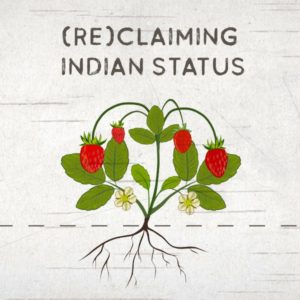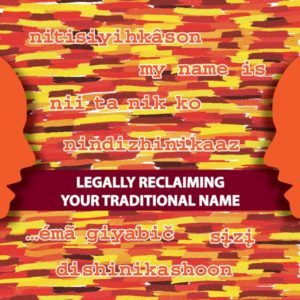What is BearPaw Media and Education?
As a department of Native Counselling Services of Alberta (NCSA), we produce and distribute free, multimedia Indigenous public legal education and information (PLEI). Our resources are for Indigenous people, by Indigenous people in Alberta and include culturally-relevant videos, publications and workshops. Our goal is to increase the confidence and self-determination of Indigenous individuals and their families in navigating complex legal systems.
Our documentary, (Re)claiming Indian Status, was a 2020 Calgary International Film Festival Winner …Our Indigenous PLEI helps guide our target populations towards better awareness and understanding of the specific ways Canadian laws affects them and their legal rights and responsibilities. Community Legal Education Ontario contends that PLEI printed text is highly effective due to its wide reach. We agree. We also combine a unique blend of multimedia resources (aimed at various learning styles, challenges and age groups) and distribution formats (print, video, workshops, online and social media platforms) to reach those in urban and rural areas. Our target audiences include:
- Indigenous (First Nations, Métis, Inuit, status and non-status) people of Alberta who are navigating legal systems themselves or with their families.
- Service providers working with Indigenous people and families. They act as a bridge to help share BearPaw resources immediately with those most in need. Our videos, publications and workshops also help to increase service provider knowledge on legal topics specific to this population.
- Other research-based organizations or institutions.
- First Nations, Métis and Inuit people across Canada and internationally with the aim to increase legal education literacy and access to Canadian legal information.
NCSA Resiliency Model in BearPaw Media and Education
BearPaw’s Indigenous PLEI mobilises Indigenous worldviews, cultural knowledges with evidence-based, healing-centred approaches. This makes our resources congruent and meaningful to Indigenous people. NCSA’s resiliency model is embedded in BearPaw’s work. It centers an interconnected worldview that privileges building, maintaining and strengthening of good relationships with all living things (LaBoucane-Benson 2009). Our resiliency model has three principles that guide BearPaw’s production and community engagement:
- Fostering reconciliation
- Reclaiming interconnected worldviews, and
- Encouraging self-determination.
Below is a brief overview of how BearPaw integrates our resiliency model principles (LaBoucane-Benson and Choby 2018).
To foster reconciliation of relationships damaged by colonization, BearPaw:
- Reconciles relationships and highlights common ground between Indigenous legal traditions and Canadian society and law
- Highlights the strength of Indigenous legal traditions
- Addresses issues related to historic trauma
- Provides content that promotes healing and reconciliation. We examine the historic and systemic roots of the issue discussed, and raise awareness on how Indigenous individuals can use the law to protect themselves.
To reclaim interconnected worldviews, BearPaw:
- Encourages connectedness to community-based resources
- Creates workshops that are culturally congruent, delivered by Indigenous facilitators and offered in Indigenous communities at no cost
- Creates good and reciprocal partnerships with agencies throughout Alberta
- Produces PLEI publications that reflect Indigenous worldviews and aim to create positive Indigenous identities
Our resources are for Indigenous people, by Indigenous people in Alberta …To encourage self-determination, BearPaw:
- Aims to increase Indigenous people’s abilities to understand and navigate legal systems, recognize the areas of law where they can assert their rights and make good decisions for themselves
- Produces resources that help Indigenous people understand their responsibilities regarding Canadian law. This increases awareness in an effort to prevent evictions, arrests, fines or incarceration.
BearPaw’s Resources
BearPaw focuses on developing new robust Indigenous PLEI. We use effective methods that target many learning styles: visual (spatial), aural (auditory-musical), verbal (linguistic) and physical (kinesthetic), social (interpersonal), solitary (intrapersonal) and logical (systems reasoning).
- We make print publications and videos that provide the most pertinent legal information related to the topic. Individuals then have the freedom to choose which type of resource best suits them depending on their preferred learning style. All videos and publications are also available in hardcopy and on our website. As we develop new workshops, we embed the new video into the facilitator’s guide to increase connection to material and dialogue with participants as a learning technique to make them visual and tactile.
- Videos are essential because they can represent Indigenous people and worldviews respectfully and in ways that are accurate to them. Videos can attend to a variety of learning styles (visual, aural, verbal, social, solitary and logical) to increase knowledge transfer. By creating videos, we can effectively reach a broader audience online or on USBs. This makes legal information accessible to Indigenous individuals and educators.
- Indigenous graphic design is necessary so that Indigenous individuals feel a sense of ownership and connection with written materials that reflect them specifically.
BearPaw’s current resources include over 40 publications and over 30 videos and workshops. Every year, we distribute over 20,000 publications, deliver over 100 public legal education workshops and hit over 98,000 video views on our YouTube channel.
Our resource topics include:
- Indigeneity: Indigenous identity, natural law, Indigenous hunting and fishing, (re)claiming Indian Status
- Criminal Justice: children and youth going to court, breach charges, Fetal Alcohol Spectrum Disorder and the law, rights with police, cyberbullying, identity theft, probation, Gladue Reports, domestic violence & reporting sexual assault, impaired driving
- Family Justice: divorce (child and spousal support, parenting and guardianship orders), parenting legal rights and responsibilities, elder abuse, kinship and foster care, adoption and the Child, Youth and Family Enhancement Act
- Other: employment rights, education (suspensions/expulsions, learning disabilities), landlord and tenant rights, money matters (payday loans, deferred payments), lateral violence, the criminalization of HIV
What’s New at BearPaw?
(Re)claiming Indian Status
Since the passing of Bill S-3 and its amendments, thousands of Indigenous people are now eligible for Indian Status. These resources provide a thorough explanation of Indian Status by answering common questions about eligibility, the application process and how to find government records that can assist you with your application. It also provides a historical overview of the Indian Act and sex-based discrimination, including government Bills that changed the Indian Act and affected Indian Status registration.
The target audience is Indigenous adults (18+ years), service providers and educators working with Indigenous communities.
Our documentary, (Re)claiming Indian Status, was a 2020 Calgary International Film Festival Winner (Audience Favourite for Documentary Short Film and Honourable Mention for Alberta Documentary Short: Lese Skidmore). This documentary digs into the stories of Indigenous women and their families to (re)claim their Indian Status through their fight for the elimination of sex-discrimination in the Indian Act. It highlights the impacts of the law on individuals, families and communities. This video also includes Status eligibility information and recommendations for finding family records.
Other resources include:
- (Re)Claiming Indian Status Booklet
- (Re)Claiming Indian Status Workshop
Obtaining Government Identification and the Right to Vote
Visit our website to view our free resources.This group of resources provides step-by-step guidance on how to get Alberta identification (driver’s licenses, Alberta ID card), how to legally reclaim a traditional Indigenous name, how to apply for Indian status and how to vote in federal elections.
The target audience is Indigenous adults (18+ years), service providers and educators working with Indigenous communities.
Legally reclaiming a traditional Indigenous name can be a part of a person’s healing journey and help define who they are as an Indigenous person. Our Legally Reclaiming Your Traditional Name wallet card explains how to legally reclaiming a traditional name at no cost until January 2024, the documents needed, and supports available to help with the process.
Other resources include:
- Fill Your Wallet (wallet card)
- Changing Your Sex Marker on Alberta I.D. (wallet card)
- Obtaining Government Identification and Voting Workshop
Visit our website to view our free resources. Follow us on social media (@BearPawLegal on Facebook, Instagram and YouTube) to stay up-to-date.
References:
LaBoucane-Benson, P. (2009). Reconciliation, repatriation and reconnection: A framework for building resilience in Canadian Indigenous families [Unpublished doctoral dissertation). University of Alberta. Edmonton, Alberta.
LaBoucane-Benson, P. and Choby, A. 2018. Indigenous Public Legal Education – PLE from an Interconnected Worldview. LawNow, Jul, 2018.



